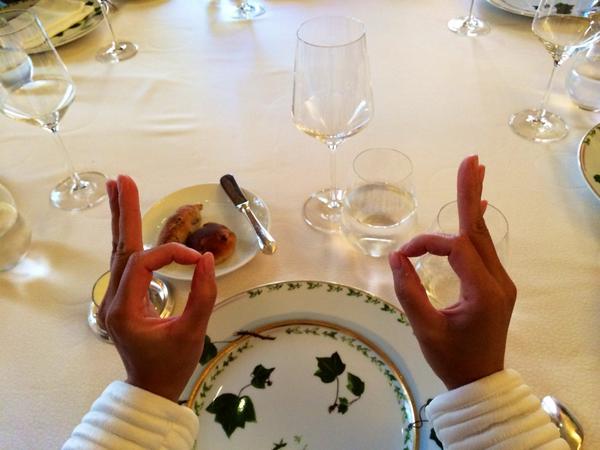By Leah H. Somerville, Jay J. Van Bavel, William A. Cunnigham, and June Gruber
Science, December 12, 2018 —

iStock.com/Connel_Design
You’ve obsessed over your written materials, wrangled letters of recommendation, and triumphed over online submission portals. At long last, you receive the call inviting you for an in-person job interview for a faculty position! But after a few high-fives, nerves set in. You want to bring your A-game, but what should you expect? How can you prepare?
Knowing what an interview is like will help you invest your precious time where it is most likely to have an impact. After all, you don’t always get a lot of lead time—Wil and June had departments ask them to come and interview with less than a week of advanced notice! Here, we’ve put together a behind-the-scenes look at how to prepare for three key elements of the interview.
First, though, before we dive into the details, we’d like to offer one big-picture reminder. Faculty interviews are often a high-pressure marathon of meetings and events, but they can also be fun—yes, fun! You get to share your work with a distinguished audience, receive focused attention from interested colleagues, and build your professional network. It can be hard to relax and enjoy the experience, but remember that the department invited you because the faculty members are already interested in what you do. They want you to succeed.
The general structure of interviews for faculty positions varies radically across disciplines and geographical areas, from formal panel interviews to informal discussions in hotel conference rooms. Some interviews include Skype calls, unstructured discussions in front of an audience (“chalk-talks”), and teaching demonstrations. In some countries, you might even find yourself at the interview dinner with several other applicants! We can’t cover every possible interview element here, so we’ve decided to focus on those that seem to be most common: a colloquium-style lecture about your research and a day or two of one-on-one and group meetings during an in-person visit.
The job talk

The job talk presentation about your primary research in front of the department.
The single most important element of faculty interviews is the “job talk.” This usually consists of a 45- to 60-minute presentation about your primary research in front of the department. Here are some guidelines on avoiding classic pitfalls we have observed (and experienced ourselves).
- Know the position. What is expected—and being evaluated—at a primarily teaching university is different than a major research university. Be mindful of the local environment and the type of position they are interviewing for, as described in the job ad, and write your talk accordingly. You increase your chances of landing an offer if you can demonstrate your fit with the position and the department.
- Frame your work for the audience. Not everyone thinks about your research topics the way you do, so it is important to be explicit about the underlying assumptions of your work. Further, many people from other fields or research areas will be evaluating you. Present your work so that it’s accessible and interesting to a general audience, and provide enough context and justification to help people understand why the work is important. The best way to prepare is to present to a lot of different audiences ahead of time and solicit feedback from faculty members and students outside your research area.
- Be mindful of the limitations of your work. Every person’s scholarly work has limitations and many audiences will try to identify these weaknesses. Be forthright about gaps in your work and use your talk to concretely explain how you will address these limitations in the future. Not only does this demonstrate your thoughtfulness and self-awareness, but it can also help ward off “gotcha” questions that require you to backpedal.
- Do not let your talk run long. This is easier said than done, but no audience member likes to see the Q&A (or their next meeting) stifled by an extra-long talk. Ask your host for the scheduled duration of your talk and the norms around questions. We have given job talks where there were virtually no questions during or after the talk, and others where aggressive questions started flying after we got past the title slide. Once you know the local norms, you can appropriately factor in additional time for questions as you’re writing and practicing your talk. Reserve a few minutes for you to be introduced, too. Then, practice until you consistently deliver your talk in the target time. If you find yourself going over time, it is a sign that you are trying to do too much. Do not talk faster; shave off content instead.
- Navigate the Q&A. This is often the most important part of the job talk, and you should prepare for it like any other part of the interview. Set up one or more practice talks in your lab or department. Invite everyone you know, and encourage them to ask the toughest, most incisive questions they can dream up. To stay calm under pressure, you can pause after a question and repeat it to the audience to ensure that you have understood exactly what is being asked. (This is especially helpful for the seven-part questions some faculty members love to ask.) If you don’t understand a question, ask for clarification. Resist the temptation to answer questions you do not understand or speak to literature that you haven’t read. If you don’t know the answer, make it clear that you are speculating or offer to get back to them once you’ve had more time to ponder it. The audience and hiring committee members do not expect you to have all the answers, they expect you to demonstrate the maturity to know when to give an authoritative response—and when not to.
- Practice. Practice. Practice. And did we say practice? There is no substitute for giving as many talks to as many tough audiences as possible over the course of your training. Practice will improve all aspects of your talk, from the way you construct your slides and how you explain your work to the fluency of your delivery and your confidence during the Q&A.
Individual meetings
The rest of your interview will probably be dominated by one-on-one meetings with current faculty members in the department. It is not uncommon to have more than a dozen meetings packed from morning until dinner! These meetings are an important opportunity to show your potential future colleagues who you are as a scientist and a person—and to figure out whether the department is a good fit for you. Remember, the interview is a two-way street and asking smart questions will help demonstrate your interest in the position.
One-on-one meetings are typically 30- to 45-minute conversations in a faculty office. These meetings might seem intimidating, but they are usually pleasant, and time passes quickly. Many topics are fair game. Most meetings are “shop talk” about each person’s scholarly work and points of common interest. Other meetings are filled by discussion about various facets of what it’s like to work at the university or live in the community. Candidates can ask the faculty members about any number of topics, including the department’s or university’s culture, resources, teaching, services, students, or tenure and promotion system. Here is a list of common interview questions that you may be asked and that you may want to ask.
To prepare further, ask your host for your schedule and research the people in advance. Some of the faculty members you meet with may not have had time to review your materials, so coming prepared to guide the conversation toward shared interests is often welcome. At a minimum, we suggest reading their departmental or lab website. You can also delve deeper by reading abstracts from some of their best known or most recent work, and even reading a few papers if you have enough time. A good rule of thumb is to prioritize those furthest from your area of expertise. Most academics are impressed if you show some familiarity with their work and perhaps how it connects with your own, even if you don’t know all the details.
You can also target specific questions about the school and department for specific people. For example, candidates often get the most valuable information by directing questions about the tenure system to faculty members who do not already have or have recently received tenure, questions about the history of a department to longtime faculty members, and questions about certain equipment or resources to people who use those same resources.
Remember, you are interviewing them, too, and faculty members will expect you to have plenty of questions. Asking well-informed questions demonstrates your seriousness about the position and will help you get the information you need to get a sense of your fit with the institution.
Finally, we have two tips for the between-meeting time. First, bring a physical printout of your schedule. Faculty members will likely shuttle you between meetings, but they often will not know where to take you. Be prepared to avoid a scramble and keep the day running smoothly. Second, take frequent bathroom breaks, even if you don’t actually need to use the toilet. You can use these breaks to catch your breath, have a drink of water, or sneak a peek at your notes for the next meeting. Reclaiming a moment for yourself can help preserve your stamina on long, busy interview days.
Group meetings and meals
Faculty interview schedules often include group meetings with graduate students or other trainees, usually over lunch. This can sometimes feel like a break from the main interview activities, but do not make the common mistake of winging it or “powering down” during these meetings! The students are often asked to provide feedback to the hiring committee.
You will be expected to lead the discussion. Ask the students about themselves, their work, and their experiences in the department. That shows your interest in them—and your readiness to take on the leadership roles required of faculty members. Asking them questions will also give you time to eat! (In case you are too busy talking to actually get enough bites in, bring easy snacks such as nuts or energy bars in your bag to eat between meetings.)

The finger positions “b” for bread on the left and “d” for drink on the right helps to remember dining protocol.
Another common group gathering is a dinner with faculty members at a local restaurant. This is a great opportunity to get to know them as a group and ask questions about the culture of the department and life outside the university. Be yourself and try to have fun—one of the great perks about academia is the great company.
Although dinner is a more informal setting, you still need to be mindful of your behavior. For one, it’s likely that alcohol will be available—but do not forget that you are on an interview and need to behave professionally. Don’t feel pressured to drink, even if everyone else is, and don’t push your limits, even if others are pushing theirs. It is also important to keep in mind that you will likely be very tired at this point in the day. We have seen many candidates struggle to stay in the conversation during dinner because they are exhausted, which can be exacerbated by alcohol. Consider your consumption carefully.
Finally, although no one should be asking you personal questions about your spouse, sexuality, religion, or other aspects of your personal life that are irrelevant to the job, these questions can arise. Feel free to reveal as much about your personal life as you are comfortable, but it is helpful to have a deft response ready to avert any questions you do not want to discuss.
The aftermath
After you head home, write individualized thank-you emails to each person you met with and to the administrator who coordinated the logistics of your visit, ideally within a few days while the experience is still fresh in your mind. Express your gratitude for their time and for their input on your work. When possible, make specific reference to what you discussed. If they gave you a good idea, tell them! If they were candid and helpful in revealing the departmental culture, tell them! If you leave an interview feeling exhilarated and extremely interested in the position, communicate that to members of the hiring committee.
We hope these tips will help you arrive feeling ready to present your best self. Remember, it is an accomplishment just to be invited for an interview! Being invited already demonstrates others have judged your work to be exciting and worth learning more about. Arrive prepared, remember that the interview is a two-way street, and don’t forget to enjoy the ride. If any of this helps you land a great job, please send us an email to let us know!
Leah H. Somerville is an associate professor of psychology at Harvard University.
Jay J. Van Bavel is an associate professor of psychology and neural sciences at New York University in New York City.
William A. Cunningham is a professor of psychology at the University of Toronto in Canada.
June Gruber is an assistant professor of psychology and neuroscience at the University of Colorado in Boulder.











